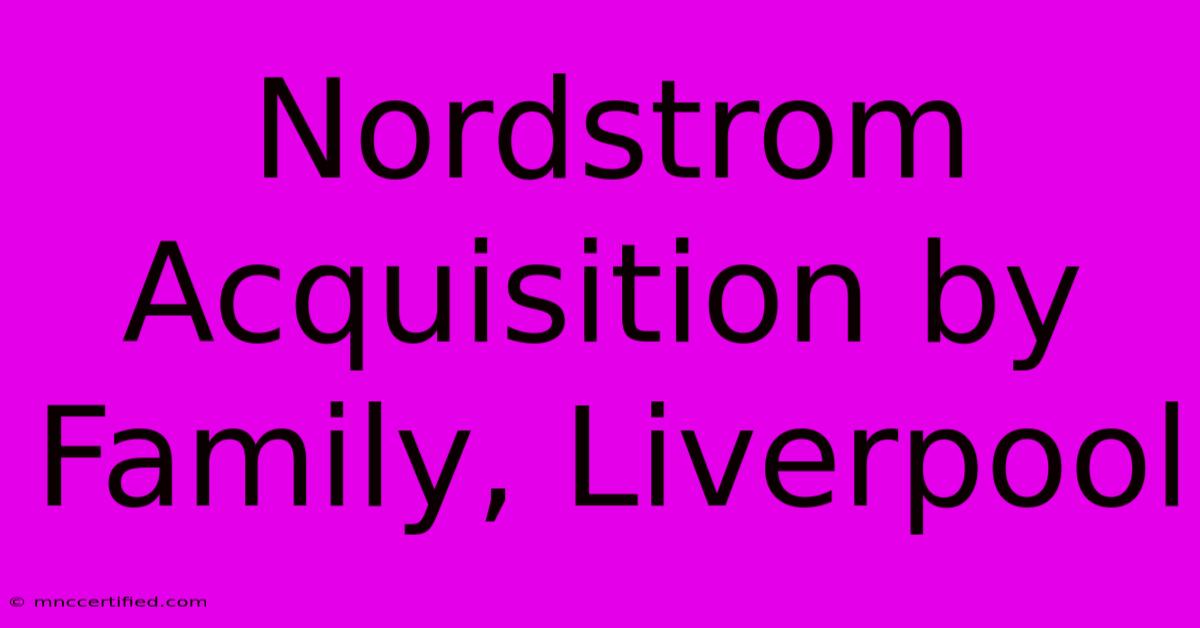Nordstrom Acquisition By Family, Liverpool

Table of Contents
Nordstrom Acquisition by Family, Liverpool: A Deep Dive into the Deal
The recent news of the Nordstrom family's acquisition of a significant stake in the iconic department store chain has sent ripples through the retail industry. This move, orchestrated by a group led by Nordstrom family members, aims to take the company private and potentially reshape its future. But what does this mean for Nordstrom, its employees, and its customers? This article will delve into the details of this complex transaction and explore its potential implications.
Understanding the Acquisition: Key Players and Stakes
The acquisition wasn't a simple buyout. Instead, a group led by members of the founding Nordstrom family, including Bruce Nordstrom and others, partnered with investment firms to secure a significant stake in the company. This consortium leveraged private equity to facilitate the purchase, taking Nordstrom private and delisting it from the New York Stock Exchange. The exact percentage of shares acquired and the financial specifics of the deal remain subject to further disclosures, highlighting the complexity of these large-scale private equity transactions. The involvement of the Nordstrom family, however, assures a level of continuity and potentially signals a long-term vision for the brand's future.
Key Questions Answered:
-
Why did the Nordstrom family pursue this acquisition? The family likely recognized opportunities for restructuring and long-term strategic changes not easily achievable as a publicly traded company. The pressures of quarterly earnings reports and short-term shareholder demands can hinder long-term strategic planning. This move allows them more flexibility in charting a course for Nordstrom's future.
-
What are the implications for Nordstrom employees? The immediate impact on employees is likely minimal, though long-term changes are possible as the family and their partners implement their strategic vision. This could include operational restructuring, focusing on profitability, and potentially streamlining certain aspects of the business.
-
What does this mean for Nordstrom customers? Customers can expect to see some changes, though the specifics remain unclear. The focus on profitability could lead to changes in pricing strategies, product offerings, or even store layouts. However, the Nordstrom family's continued involvement suggests a commitment to upholding the brand's established reputation and customer experience.
Navigating the Challenges: Opportunities and Risks
While this acquisition offers potential benefits, it also presents significant challenges.
Opportunities:
- Strategic Restructuring: Going private allows for greater flexibility in restructuring operations, potentially streamlining processes and enhancing efficiency.
- Long-Term Vision: Freed from the constraints of quarterly reporting, the Nordstrom family can focus on a long-term vision for the brand, potentially investing in innovative technologies and enhancing the customer experience.
- Enhanced Competitiveness: The acquisition could give Nordstrom the resources to better compete in an increasingly challenging retail landscape dominated by e-commerce giants and discount retailers.
Risks:
- Debt Burden: The significant investment required to take Nordstrom private will likely result in a considerable debt burden, adding pressure to achieve financial goals.
- Execution Challenges: Successfully restructuring a large, complex organization and adapting to changing market trends requires careful planning and execution.
- Maintaining Brand Identity: While the Nordstrom family aims to preserve the brand's identity, changes implemented to improve profitability could negatively impact customer perception and loyalty.
The Future of Nordstrom: Predictions and Analysis
The acquisition represents a pivotal moment in Nordstrom's history. The success of this endeavor hinges on the ability of the Nordstrom family and their partners to effectively manage the challenges and capitalize on the opportunities. The retail landscape is highly competitive, and the success of this acquisition will be determined by several factors, including successful integration of strategies, market adaptation, and a commitment to maintaining customer satisfaction. This is not merely a financial transaction; it is a significant strategic shift with far-reaching implications for the future of one of America's most iconic department stores. The coming months and years will be crucial in determining the long-term outcome.
Keywords: Nordstrom acquisition, Nordstrom family, Liverpool, private equity, retail industry, department store, strategic restructuring, business strategy, financial analysis, market trends, brand identity, customer experience, e-commerce, competition.

Thank you for visiting our website wich cover about Nordstrom Acquisition By Family, Liverpool. We hope the information provided has been useful to you. Feel free to contact us if you have any questions or need further assistance. See you next time and dont miss to bookmark.
Featured Posts
-
Merger Impact Honda Nissan Us Jobs
Dec 24, 2024
-
Nordstrom Acquired By Family And Liverpool
Dec 24, 2024
-
Suspect Charged Murder Arson
Dec 24, 2024
-
Buehler Red Sox Agree To 21 M Deal
Dec 24, 2024
-
Greenland Ownership Trumps Stance
Dec 24, 2024